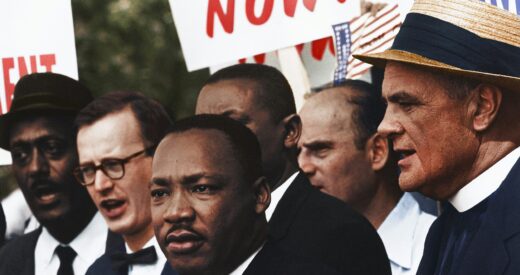Over the past few months, my friends at The Diversity Movement have graciously given me a platform to share my personal journey of awakening, as I’ve shed both bias and outright bigotry toward those who are different from me over the course of these 50 trips I’ve made around the sun. In short, I was raised in the deep South in a culture that could be outright hateful at times, both openly and behind closed doors, especially toward people of color and those representing the LGBTQ+ spectrum. But in the years since, life has confronted me with people and situations that summoned me to be a better human.
At the rather ripe age of 45, my wife and I – both White people – found ourselves becoming a transracial family through adoption. This experience, as an ally to people of color, has been eye-opening to say the least. When I tell people about it, I usually describe the demand on me as a father and on us as parents as we are navigating the bridge from empathy to sympathy for the people who are now our fellow parents of children of color.
These days, there’s a growing swarm of discussion in both our public and private lives about the impact of education regarding our past, present, and even future realities of discrimination, privilege, and bias. Many individuals object to these educational efforts, whether they are related to teaching our nation’s history of racism to schoolchildren or confronting workplaces that are neither diverse, nor inclusive, nor fair to all. Some people object on the grounds of discomfort, coupled with the notion that they or their children shouldn’t be challenged on these fronts, since they don’t believe they actively participate in acts of racism, sexism, or homophobia and therefore shouldn’t have to address issues they believe are behind us as a society.
Over the holiday season, I had a moment of clarity I’d like to share with those whom I believe have sincerely held positions on these topics. I think we can all agree that going through pain or discomfort is often worth the struggle when there’s a reward to be had at the end. In this case, making our workplaces and society more fair to everyone involved is certainly a worthwhile goal, especially if it means, in the end, that everyone’s child can thrive and explore the opportunities that our country currently affords to only some people.
Here’s what happened.
You see, my wife and I read to our son every day. One of the blessings of the first 4 ½ years of our life with him is that we’ve been equipped with many books that duly represent what all children look like and experience, uniquely – in his case, being Black and biracial. It struck me and his mom how early children start to look for themselves in illustrated characters in books. At 2 and 3, Zeke would point to children of color placed in multiracial groups and always identify with the child who had the darkest complexion.
A few nights after Christmas, my wife pulled out one of the latest additions to our little library, Our Skin: A First Conversation About Race by Megan Madison and Jessica Ralli. I listened as my wife read to my son each of the little pages showing children across the color spectrum, highlighting the beauty in their differences.
Then, the story turned, in an age-appropriate way, to talk about how some people treat other people differently based on the color of their skin and make decisions that aren’t fair on this basis. At the end of the 15 minutes or so that it took to read the book, I found my face covered in tears.
I had the same feelings that researchers say many White parents hold when discussing race with children. According to the American Psychological Association, children notice race several years before adults want to talk about it. Many White parents adopt strategies that are inadvertently harmful in the long run, like promoting colorblindness or refusing to talk about race entirely. While I have rejected colorblindness as a parenting strategy, at that moment, I definitely wondered if we were sharing material about race with our son at too early an age.
As I cried while watching my wife rock our sweet son to sleep (yes, he still lets us do that once in a while), I had an epiphany of sorts.
As parents, we have a primal instinct to protect our children. I can confirm that this primal instinct applies to adoptive parents all the same. One of the aspects of adoption that many, if not all adoptive parents at least lightly question, is the level of attachment they will have with their child. Also, I also think that most of us, parents or not, believe that we must protect all children, and not just our own.
My epiphany was that part of our job in protecting Zeke is to confront concepts that may be uncomfortable for us and for him. Just as we recently had a chat about how wandering from home may put him in danger to someone who might take him away, we also need to talk with him about racism and colorism. In the same way that we do not want abduction to be his first experience with the concept of kidnapping, we also don’t want an outright act of bigotry or a thoughtless microaggression to be his first experience with racism.
Not everything we do as parents is all hugs and kisses. Nor is everything we do at work composed of motivational quotes, uplifting team talks, and happy hours. To create spaces where we can all thrive, those of us with higher quantities of privilege must be willing to leverage our advantages and have hard conversations, taking on difficult, often emotional concepts.
Even the most empathetic among us needs to hear about the struggles that are real for those we love – and those we respect– at work.
In the process, it’s important to remind ourselves that diving into these issues as conversations is far less painful than actually living them. That’s another realization I’ve had: that my pain in confronting racism and bias as a parent of a child who will almost inevitably experience them is far less than what he may have to endure. When my wife and I jumped at the chance to adopt Zeke, we also realized the inherent responsibilities of raising a child of color.
Just as I am holding myself accountable for learning and growth in my personal life, we should also hold ourselves accountable for DEI learning in the workplace as well. We don’t have separate personal and professional selves, after all. We have one life, and our learning in each of these places inevitably soaks through to the other.
The people we work beside – and their well being – are worth it, just as my son’s well being is worth it. If we are truly committed to workplace excellence, then we must also be committed to the more uncomfortable explorations and discoveries within the realm of diversity, equity, and inclusion. And, we must be compassionate enough to know that someone else in the room may find the topic more painful than we do. The good news is, we’re in this together.
Brian Castle is the Founder & CEO of Parklife Communications, a full-service content shop serving small and mid-sized companies and larger agencies with a digital marketing focus. Brian is passionate about collaborating with executives and entrepreneurs to help tell their stories to effect positive change.






